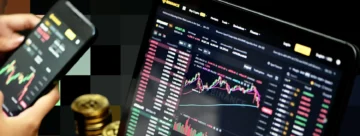Bitcoin’s Limitless Growth Potential: Why It’s Becoming Undeniable Fact

For a long time, the idea of Bitcoin being digital gold was confined solely to enthusiasts within the crypto community. Besides, there was always a personal material interest behind the media support from almost all Bitcoin maximalists, consisting of at least monetizing public attention and boosting the value of their own crypto investments. It all seemed too apparent for economists and financial experts to take such a concept seriously.
But as the saying goes, little strokes fell great oaks. Now, nearly 16 years after the launch of the Bitcoin blockchain, its value has breached the $100,000 mark. Most experts unanimously predict the asset’s continued growth. In fact, even Jerome Powell, Chair of the U.S. Fed, has acknowledged Bitcoin as digital gold, noting that it competes more directly with physical gold than with the U.S. dollar.

Bitcoin Vs. Gold: Key Similarities
Physical gold and Bitcoin share quite a few things in common, including:
- Scarcity. Gold is limited by natural reserves and extraction capabilities, while Bitcoin’s supply is capped programmatically.
- Decentralization. Neither asset is controlled by any government entity or financial institution.
- High liquidity. Both are traded globally and can be quickly exchanged for cash or other assets.
- Investment role. Both are seen as stores of value, a means of hedging against inflation and economic instability.
Bitcoin outperforms gold in the first two aspects, being both more scarce and more decentralized. In terms of liquidity, Bitcoin is rapidly catching up. According to the World Gold Council, the average daily trading volume of gold was $162.2 billion in 2023, rising to $268.2 billion in October 2024. Meanwhile, Bitcoin’s daily trading volume exceeded $172.2 billion as of December 5, 2024, CoinGecko reported.
Given the growing institutional adoption of Bitcoin, the global trend toward clearer regulatory frameworks, and the increasing depth of the cryptocurrency market, BTC’s liquidity could exceed that of gold in the foreseeable future.
Other important features between physical and digital gold include their sustained upward price trend and speculative nature. In both aspects, Bitcoin shows greater potential. Meanwhile, the gold market cap is $17.934 trillion, while Bitcoin’s capitalization is only $2.026 trillion. So this leaves ample room for its growth.

Bitcoin’s Rising Popularity as a Reserve Asset
The subtitle here highlights a key factor leading to the seemingly limitless growth potential of Bitcoin’s value. Sure, “limitless” is a relative term, much like the value of gold, which has steadily increased over the past 50 years. According to the World Gold Council, the price of an ounce of gold in the spot market has risen by over 3,900% during this period. Meanwhile, Bitcoin has soared by more than 152,000% in less than 12 years, according to CoinGecko.
One of the major drivers of demand for physical gold is its use as a reserve asset by central banks, international organizations, commercial banks, financial institutions, and institutional and private investors. The World Gold Council reports that official gold reserves exceed 34,000 tons, with the asset likely to keep serving as a financial safety net. However, Bitcoin’s popularity in this context is growing exponentially. This can be seen in the surge of related news over the past few weeks:
- Jiva Technologies, a wellness products manufacturer, announced plans to invest up to $1 million in BTC as part of its corporate financial strategy;
- Genius Group, an AI products developer, converted most of its treasury reserves to Bitcoin, purchasing 110 BTC worth $10 million;
- Rumble, a video hosting platform, plans to invest $20 million in Bitcoin to diversify its financial reserves;
- Semler Scientific, a medical technology provider, acquired 215 BTC worth $17.7 million, bringing its total holdings to 1,273 BTC;
- Marathon Digital, a tech company, purchased an additional 6,474 BTC, increasing its portfolio to ~34,794 BTC.
This list could go on, with examples like Japan’s Metaplanet, which expanded its Bitcoin investments to hold approximately 639.5 BTC, resulting in a phenomenal rise in its stock value. Metaplanet follows the strategy of MicroStrategy, which recently added 15,400 BTC worth $1.5 billion to its portfolio, bringing its total holdings to ~402,100 BTC and securing its position as the leading public corporate Bitcoin holder.
As of November 2024, data from River shows that 62 publicly traded companies have adopted Bitcoin as a reserve asset, and this trend is only expected to grow.
Moreover, similar trends are gaining traction at the governmental level. Donald Trump, recently re-elected as U.S. President, pledged during his campaign to include Bitcoin among federal reserve assets. His administration appears committed to this initiative, considering the U.S. government currently holds about 213,246 BTC. Similar proposals are under consideration at the state level in the U.S., as well as in other countries like Brazil. Meanwhile, El Salvador, a pioneer in this area, continues its successful policy, accumulating over 5,955 BTC.
It’s worth noting that spot Bitcoin ETFs now hold 5.54% of the total available BTC supply, according to SoSo Value, and this percentage continues to rise.
The trend is clear: demand for Bitcoin is growing across all market participants and will only increase. Meanwhile, its supply is decreasing, as holders are likely to sell only under extreme circumstances. However, the market for financial derivatives will expand, and the increasing scarcity of the underlying asset will consistently drive its price upward. Within the framework of the current global economic model, the growth potential of Bitcoin appears limitless, barring one of the rare catastrophic scenarios previously discussed by CP Media.
Note: All ideas described in this article are presented for informational purposes only. They are not intended as investment advice. The author does not encourage the sale or purchase of any assets and is not responsible for decisions based on the material’s information.











